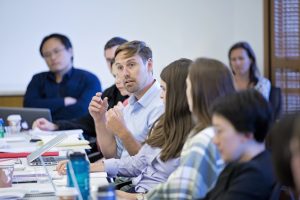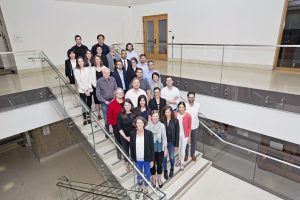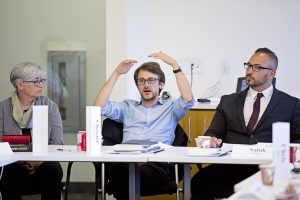2018 Junior Scholars Forum Recap

Chris Rea, Assistant Professor, John Glenn College of Public Affairs, Ohio State University leads discussion for Diana Jue-Rajasingh, Ph.D. Candidate, Business Administration and Sociology, University of Michigan.
The Center on Philanthropy and Civil Society at Stanford convened a cohort of emerging scholars for the fifth annual Junior Scholars Forum on Stanford University campus, June 18–20, 2018. This year, Stanford PACS was excited to welcome 10 scholars, one each from Boston University, University of Michigan, Michigan State University, University of Southern California, University of Minnesota, Northeastern University, University of Toronto and Stanford University, and two from Harvard University. The diverse cohort is representative of the growing corpus of academic work related to philanthropy and civil society across disciplines and professional schools such as schools for education, government, and public policy, among others.
The forum also included 20 discussants – 2 for each paper – drawn from the Stanford PACS academic community and matched to the respective disciplines of each junior scholar.
Stanford PACS’s mission is to develop and disseminate knowledge. We do this partly by creating an interdisciplinary environment for scholars. The Junior Scholars Forum fosters discussion on philanthropy and civil society, and this year the scholars explored topics such as effective altruism, philanthropy’s role in environmental policies, the role of foundation money in politics, philanthropy and inequality, and donor motivations. The scholars at this year’s forum paid special attention to institutional forms of giving, philanthropic efforts in educational reform, and opportunities to improve impact in international development efforts.
__

2018 Junior Scholars and discussants gather at Stanford Center on Philanthropy and Civil Society June 19, 2018.
The day began with a discussion of Carrie Oelberger’s paper on “Building a Theory of Institutional Learning: An Analysis of Philanthropic Foundations.” Carrie is an Assistant Professor at the Humphrey School of Public Affairs at the University of Minnesota. Her paper builds on Jim March’s study of organizational learning through and advances this through testing a theory of partner selection around institutional exploitation and institutional exploration. She finds that institutional exploration exists in organizations with greater internal ability to moderate uncertainty and those that exist in environments that encourage innovative behavior.
Emily Bryant, a doctoral candidate in sociology at Boston University then presented her paper on “More than Simply Motive: International Grantmakers and the Pursuit of Maximal Impact.” In this paper, Emily examines how major U.S. foundations make decisions on which organizations and projects to fund, finding that how much impact the foundation could make toward solving a particular issue was a key driving force in funding distribution.
Bryant was followed by Diana Jue-Rajasingh, a doctoral candidate in business administration and sociology at the University of Michigan, presenting “Coming Clean: How a Transnational Coalition Shapes National Clean Cookstove and Fuel Markets.” Jue-Rajasingh studies the effect of a transnational social movement coalition organization on entrepreneurship in an emerging field. Her paper argues that the strength of cross-border knowledge transfers relies on cultural and political similarities.
The afternoon session began with Leslie Finger, a lecturer in government and social studies at Harvard University. Her paper “Giving to Government: The Policy Goals and Giving Strategies of New and Old Foundations,” explores how new foundations choose their grant recipients through analyzing grant support for the state education. Fieldwork and data analysis revealed that need alone doesn’t drive grant strategy, rather, education agencies were more likely to receive support in states where there was strong support for school reform and weaker teachers’ unions.
Nabih Haddad, a doctoral candidate in education at Michigan State University, followed with an extension of research that explores the role that wealthy philanthropists increasing play in setting educational policy in K-12 education. His paper titled “Philanthropic Investments and Higher Education: Is Funding Moving Away from the University,” finds that major U.S. foundations are moving away from giving directly to universities and are instead donating to outside organizations supporting initiatives that they favor.

Scholars engage in lively discussion during the forum. Pictured here is Lucy Bernholz (left), Christof Brandtner (center), and Nabih Haddad (right).
Aaron Horvath, a doctoral candidate in sociology at Stanford, explores the ideals of public administration and good government in the United States from late-19th to mid-20th centuries to understand the processes by which such ideals come to fruition and evolve. He argues that “ideals take shape through encounters between adjacent social realms, becoming codified in organizations, persons, practices, and ideas,” in his aptly titled paper “Ideals of Order: Activists, Academics, Administrators and the Ideal of Good Government in the United States, 1870-1969.”
The first day concluded with a presentation by Emily Rosenman, a postdoctoral fellow in geography at the University of Toronto. Rosenman discussed how private profits are derived from preexisting social services and the practices of poverty management that accompany those investments in “Capital and Conscience: Managing Poverty through Impact Investing in the San Francisco Bay Area.” After analyzing financial and government arrangements of an impact investment made in subsidizing Bay Area housing, she concludes that the municipality leverages existing public subsidies to attract social finance capital based on “practices that divide spaces of urban poverty into new trances of ‘deservingness’ as defined by the goals of new-entrant investors and financial intermediaries.”
The second day of the forum began with an argument against Bad Samaritan laws by Asbjorn Melkevik, a postdoctoral fellow in ethics at Harvard University. Through his paper “Against Samaritan Laws: The Good, the Bad and the Ugly”, he endorses the use of Good Samaritan Laws to incentivize rescuing persons in grave peril, above Bad Samaritan laws, which he finds to be retributive in nature.
Alexandra Graddy-Reed, an assistant professor at the Price School of Public Policy at the University of Southern California, followed with a discussion on the role of organizational identity on innovation beyond traditional for-profit firms. Her paper “Calibrating Innovation Across Sectors: Decisions of Risk and the Role of Organizational Identity,” uses survey data in the state of North Carolina to estimate the effect of organization identity on innovation and potential for innovation, comparing differences across sectors.
The final paper of the forum was presented by Emily Clough, assistant professor at Northeastern University. In “The Inadequacy of Resources Without Reform: The Case of Partnered Provisioned NGOs,” Clough studies an educational reform initiative in Punjab, India, that involved a partnership between the state government and an NGO offering ongoing literacy programming. The paper serves as a case study to examine factors of political economy to enact sustainable reform in developing countries.
We hope this year’s convening has encouraged participants in their academic pursuits by providing helpful insights into their ongoing research and expanding their academic network. The 2019 Junior Scholars Forum is scheduled for June 6-8, 2019 at Stanford University campus. For the 6th annual Junior Scholars Forum we will invite scholars who participated in previous years to share their upcoming work and receive commentary from an interdisciplinary cohort of scholars.
